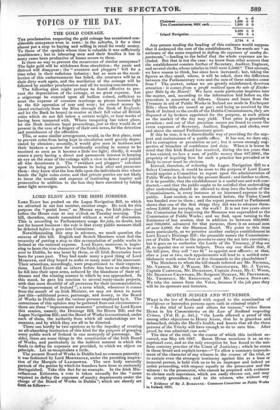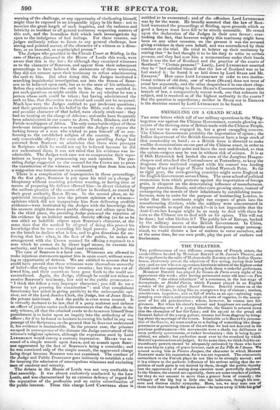SCOTCH JUDGES AND WITNESSES.
WHAT is the law of Scotland with regard to the examination of irreligious or heterodox persons upon oath in criminal trials? " In the trial of Lowe and others for treason," writes Baron Hustz in his Commentaries on the Law of Scotland respecting Crimes, (Vol. II. p. 341,) "the Lords allowed a proof of this among other objections to Henry Adam, that he is graceless and debauched, drinks the Devil's health, and boasts that all the three persons of the Trinity will have enough to do to save him. After proof, he was admitted cum nota."
The date of the trial, in the course of which this incident oc- curred, was May 4th 1687. Baron HUME mentions it as an ex• ceptional case, and as the only exception he has found to the uni- form contrary practice of the Court of Justiciary; which he states in these broad and explicit terms—" To allow a summary impeach-, ment of the character of any witness in the course of the trial, or to sustain even the strongest testimony against him as a base or immoral person, is held with us to be an improper and indeed an unfair proceeding, with respect equally to the prosecutor and the witness : to the prosecutor, who cannot be prepared with evidence to obviate such aspersions, which are easily thrown out, and may be utterly groundless ; and to the witness, who without any
• Evidence of Sir T. BURGOYNE : Commons Committee on Public Works in Wand, 1835.
warning of the challenge, or any opportunity of vindicating himself, might thus be exposed to an irreparable injury in his fame : not to mention the great length of such inquiries, and the rashness and lubricity so incident to all general testimony respecting matters of this sort, and the boundless field which such investigatias lay open to the indulgence of bad feelings. For these reasons, our judges uniformly refuse to listen to any general challenge, how strong and pointed soever, of the character of a witness as a disso- lute, or an immoral, or unprincipled person." The Judges who presided in the Circuit Court at Stirling, in the case of HENRY, discussed in the House of Lords this week, were aware that this is the law ; for although they examined witnesses as to the character of Simesos, and appear from their subsequent proceedings to have believed the statements of those witnesses, they did not venture upon their testimony to refuse administering the oath to him. But after doing this, the Judges instituted a searching inquisitorial investigation, not into the fitness of SIMP SON to be believed upon oath, but as to the state of his orthodoxy. Before they administered the oath to him, they were entitled to put such questions as might enable them to say whether he was a person whose oath could be taken ; but having administered the oath to him, that discussion was closed and could not be reopened.
Much less were the Judges entitled to put irrelevant questions ; and their questions as to his belief in the Bible, and to the extent and peculiar character of that belief, were clearly irrelevant : they had no bearing on the charge of Atheism ; and oaths have frequently been administered in our courts to Jews, Turks, Hindoos, and the Fetish-worshippers of Africa. The only conceivable object of these irrelevant interrogatories was to enable the Judges to expose the lurking heresy of a man who wished to pass himself off as con- forming to the established religion of the country. We say the only conceivable object ; for even after the presiding Judge had
extorted from SIMPSON an admission that there were passages in Scripture which he would not say he believed because he did
not understand them, it was not ruled that his evidence was in- admissible. The Judges took care not to compromise their repu- tations as lawyers by pronouncing any such opinion. The pre- siding Judge suggested to the counsel for the Crown not to press the examination of the witness; well knowing that from him such a suggestion was tantamount to a command.
There is a complication of improprieties in these proceedings. In the first place, SIMPSON is put upon his trial on a charge of blasphemy without receiving previous warning, or having time or means of preparing his defence allowed him—in direct violation of the uniform practice of the courts of law in Scotland, as stated by their great authority Baron Hums. In the second place, an in-
quisitorial investigation into the private opinions of a witness— opinions which did not incapacitate him from delivering credible
evidence—were instituted by the Judges with the knowledge that his answers might draw down public obloquy and odium upon him. In the third place, the presiding Judge procured the rejection of his evidence by an indirect method, thereby affixing (as far as he
was able) an indelible stigma upon SIMPSON'S character, at the same time that the method he adopted of doing this proved his
knowledge that he was exceeding his legal powers. A judge sits on the bench to declare what is law, and to give directions for en- forcing that law : when, in the face of the public, he makes an
arrangement with the Crown counsel for affixing a reproach to a Mtn which he cannot do by direct legal means, he exceeds his authority, and his conduct is illegal and tyrannical. The case of SIMPSON is a hard one. Witnesses are allowed to make injurious statements against him in open court, without warn-
ing or opportunity of defence. We are entitled to assume that he could have proved that those witnesses were themselves unworthy of belief—that they were his bitter enemies: but time was not al- lowed him, and their assertions have gone forth to the world un- contradicted. Again, the Judge, although he could not refuse to receive SIMPSON'S testimony, has said to the public prosecutor- " I think this fellow a very improper character ; you will do me a favour by not pressing his examination " : and that complaisant functionary has aided in giving publicity to the unfavourable opi-
nion, not of the Lord Justice Clerk, the Judge, but of JOHN Hoes, the private individual. And the public is even worse treated. It is virtually declared to be law, that if a party maltreat and deforce an officer of justice under such circumstances that the officer is the only witness, all that the criminal needs to do to screen himself from
punishment is to insist upon an inquiry into the orthodoxy of the officer ; for if he be found to hesitate in owning his belief in.any one
passage of the Scriptures, on the ground that he does not understand it, his evidence is inadmissible. In the present case, the prisoner escaped in consequence of the distaste the Judge entertained of the witness's religious opinions, although the expression used by Lord LYNDHURST would convey a contrary impression. HENRY was ac- cused of a simple assault upon ADAM, and an assault upon 8/81P EON aggravated by the fact of SIMPSON'S being a constable ; and be was convicted only of the simple assault, the aggravated charge being dropt because SIMPSON was not examined. The conduct of the Judge and Public Prosecutor goes indirectly to establish a rule for insuring the admission of unscrupulous witnesses and excluding men of candour and veracity.
The debate in the House of Lords was not very creditable to that assembly. It was ahnost exclusively conducted by the Law Lords, and was characterized by an extreme delicacy of regard for the reputation of the profession and an entire subordination of the public interest. From this charge Lord CAMPBELL alone is
entitled to be exonerated; and of the offenders Lord LYNDHURST was by far the worst. He broadly asserted that the law of Scot- land warranted the proceedings at Stirling, upon grounds which so good a lawyer must have felt to be utterly untenable. He rested upon the declaration of the Judges in their own favour; over- looking the fact, that however weighty this testimony might have been on any other occasion, on the present it was the accused giving evidence in their own behalf, and was contradicted by their conduct on the trial. He tried to bolster up their testimony by stating that " he had thought it to be his duty to write to certain persons, and they had sent him a memorandum under their bands that it was the law of Scotland and the practice of the courts of Scotland." "Certain persons 1 " Lastly, Lord Lyrroauasr asserted that he " bad satisfied himself that the law of Scotland was as he had stated it : he found it so laid down by Lord STAIR and Mr. ERSKINE." How came Lord LYNDHURST to refer to two institu- tional writers of old date, one of whom (STAIR) does not treat of penal law separately, and the other despatches it in one short chap- ter, instead of referring to Baron Humes Commentaries upon that branch of law, a comparatively recent work, one that exhausts its subject, and is received as of the highest authority in the courts ? But the question is superfluous ; neither in STAIR nor in ERSKINE is the doctrine stated by Lord Lrsonuasx to be found.



























 Previous page
Previous page